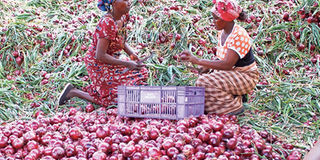Unleash economic power of women and watch the world grow

Two women prepare onions for the market in Kilongoni, Makueni County in September 2019. PHOTO | PIUS MAUNDU | NATION MEDIA GROUP
What you need to know:
- Research from the World Bank and others shows that unleashing the economic power of women can contribute to global growth.
- The World Bank Group is supporting countries in achieving this goal in important areas, including the removal of discriminatory laws.
Girls are attending school in greater numbers than ever before, and women are increasingly entering the labour force and leading businesses.
Although we should celebrate this progress, much work remains in order for a girl to have the same opportunities as a boy.
Research from the World Bank and others shows that unleashing the economic power of women can contribute to global growth. Moreover, it’s the right thing to do.
Fortunately, more countries recognise that economies can reach their full potential only with the full participation of both women and men.
DISCRIMINATORY LAWS
The World Bank Group is supporting countries in achieving this goal in important areas, including the removal of discriminatory laws, investment to close gender gaps, broadening access to finance, and stepping up efforts to prevent gender-based violence.
Encouragingly, our 2020 Women, Business, and the Law report — which measures how laws and regulations affect economic opportunities for women in 190 economies — highlights the progress being made.
Gender-focused policies and programmes can further enable girls and women to realise their economic potential. These include targeted investments aimed at encouraging girls to stay in school longer, so that they are empowered with the education and skills to participate in the labour force as adults.
It is no less important to boost women’s mobility and encourage them to seek paid work. Here, success requires reducing harassment in public transport, taking working mothers’ needs into account when setting bus or train schedules, and ensuring that journeys are safe, well-lit, and accessible.
FUNDING SHORTAGE
Broadening women’s access to finance is also critical. The International Finance Corporation (IFC), the World Bank Group’s private-sector lending arm, estimates that, globally, women-led businesses face a credit gap of $1.5 trillion (Sh150 trillion).
The Women Entrepreneurs Finance Initiative (We-Fi), based at the World Bank, is designed to address this funding shortage and remove other barriers women entrepreneurs face.
Backed by the United States, Germany, Japan, Saudi Arabia, and the UAE, among others, it aims to support 115,000 woman-owned small and medium enterprises in over 50 countries and crowd in more than $2.6 billion (Sh260 billion) in private- and public sector funding.
Together with International Monetary Fund Managing Director Kristalina Georgieva and Ivanka Trump, I took part in the recent We-Fi Summit in Dubai, where we discussed with government ministers from the Middle East and North Africa region how to unlock opportunities for women, including through improved access to finance.
TECHNOLOGY
Leveraging technology, including by shifting more cash transactions to digital channels, can give women greater control over their own resources. Such innovations can also deliver other benefits: A 2016 study in Kenya found that providing women with access to mobile money services increased household savings by more than a fifth and reduced extreme poverty among woman-headed households by 22 per cent.
The private sector has been leading the way in mainstreaming digital financial services. In Egypt, financial services provider Fawry, an IFC client, enables more than 2.5 million transactions per day and recently launched the country’s first female e-payment agent network.
But, in addition to discriminatory laws and lack of access to capital and assets, girls and women in many parts of the world are also shackled by norms that suggest a girl is of less value than a boy.
Gender-based violence is one of the most pernicious manifestations of this deep-seated bias. Today, shockingly, one in three women worldwide has experienced physical or sexual violence.
The good news is that countries are making progress in preventing and responding to gender-based violence. Work funded by the World Bank and the Sexual Violence Research Initiative in the Solomon Islands, for instance, shows that such violence is no longer accepted once communities, supported by faith leaders and government service providers, speak out against it.
BEST PRACTICES
And as best practices emerge regarding how to help survivors of violence, practitioners must join forces to share the lessons learnt. Providing women’s networks with social support, violence risk training, and confidence-building programmes also can help.
On this year’s International Women’s Day, I would like to re-emphasise that the World Bank Group stands ready to join forces with all stakeholders working to empower women and unleash their economic potential.
Mr Malpass is President of the World Bank Group. Copyright: Project Syndicate 2020.
Mutuma Mathiu’s column will resume next week.





